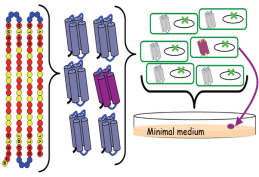 Wow, now this is truly exciting … a team of Princeton University scientists led by professor Michael Hecht have constructed for the first time artificial proteins that enable the growth of living cells.
Wow, now this is truly exciting … a team of Princeton University scientists led by professor Michael Hecht have constructed for the first time artificial proteins that enable the growth of living cells.
The team have actually created genetic sequences never before seen in nature, and so they have now shown that they can produce substances that sustain life in cells almost as readily as proteins produced by nature’s own toolkit.
“What we have here are molecular machines that function quite well within a living organism even though they were designed from scratch and expressed from artificial genes,” said Michael Hecht, a professor of chemistry at Princeton, who led the research. “This tells us that the molecular parts kit for life need not be limited to parts — genes and proteins — that already exist in nature.”
This is a huge leap forward for synthetic biology … think of it this way, if the goal is to achieve an entirely artificial genome composed of unique patterns of chemicals, then this puts that goal within reach, we are of course not there yet.
Although scientists have shown previously that proteins can be designed to fold and, in some cases, catalyze reactions, the Princeton team’s work represents a new frontier in creating these synthetic proteins.
The research, which Hecht conducted with three former Princeton students and a former postdoctoral fellow, is described in a report published online Jan. 4 in the journal Public Library of Science ONE.
“What I believe is most intriguing about our work is that the information encoded in these artificial genes is completely novel — it does not come from, nor is it significantly related to, information encoded by natural genes, and yet the end result is a living, functional microbe,” said Michael Fisher, a co-author of the paper who earned his Ph.D. at Princeton in 2010 and is now a postdoctoral fellow at the University of California-Berkeley. “It is perhaps analogous to taking a sentence, coming up with brand new words, testing if any of our new words can take the place of any of the original words in the sentence, and finding that in some cases, the sentence retains virtually the same meaning while incorporating brand new words.”
You can read more about this here, and here.
Now, one immediate question that will pop up is to wonder how this relates to the synthetic life announced last year by J. Craig Venter. If he announced the creation of a synthetic cell – the world’s first self-replicating life form, then why is this a big deal? Well, critics argue that Venter didn’t build life from scratch because he used a natural genome as a blueprint. What this now does is to put us well down the road towards the creation of a synthetic genome as well.